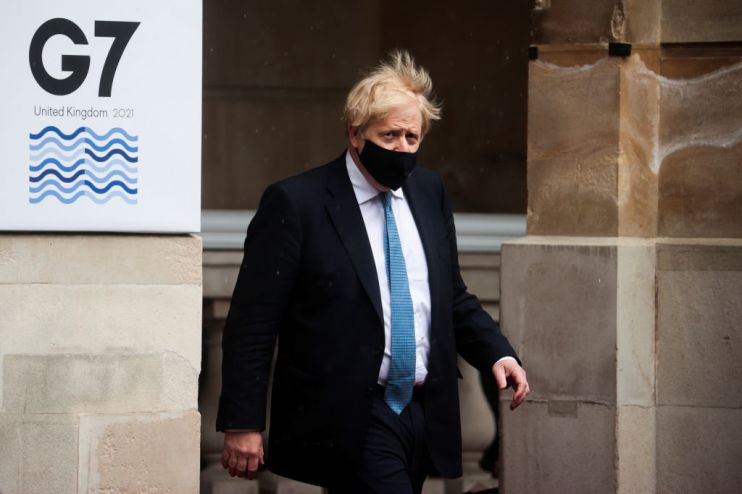G7 summit: What Boris Johnson wants to achieve in Cornwall

This weekend’s G7 summit in Cornwall will be Boris Johnson’s opportunity to show the western world that the UK can maintain its global status post-Brexit.
Coming at a time of unique disruption, Johnson will hope the summit can help paint the UK as a global problem solver for the globe’s largest 21st century challenges.
The Prime Minister will welcome leaders from the US, Canada, Germany, Italy, France and Japan – along with a group of leaders from guest countries like Australia – to the luxury Carbis Bay resort on Friday afternoon.
The summit already has some momentum, after finance ministers from the G7 countries inked an historic tech tax agreement last weekend.
The deal aims to make the world’s largest tech multinationals, such as Amazon and Facebook, pay more tax in G7 countries instead of tax havens.
Johnson, Joe Biden and co will now move on to the small issues of stopping a global climate catastrophe, preventing hundreds of thousands of Covid deaths and curtailing China’s illiberal approach to geopolitics.
Climate change
One of the key focuses of the G7 will likely involve cobbling together the groundwork of a future climate change treaty for the Cop 26 climate summit in Glasgow this year.
The Times reported yesterday that the G7 summit will see the Prime Minister call for a climate change Marshall Plan in reference to America’s post-war rebuilding effort in Europe.
The proposal would see the world’s richest economies pour money into developing nations to help them drastically cut carbon emissions.
Downing Street believes that a plan of this nature can help put pressure on large emitters like China, Brazil and India to get serious about global net-zero
Johnson has pushed hard on his government’s green credentials over the past year, particularly in talks with US President Joe Biden.
His team see Cop26 as a way to build a close relationship with Biden, after many pre-election predictions that a Democrat White House would shun Johnson.
The President wrote in the Washington Post this week that the summit will pose the “defining question of our time”.
He said: “Can democracies come together to deliver real results for our people in a rapidly changing world?
“Will the democratic alliances and institutions that shaped so much of the last century prove their capacity against modern-day threats and adversaries? I believe the answer is yes.”
Covid and vaccines
The Prime Minister has already announced that he will call on the G7 leaders to help vaccinate the entire world against Covid-19 by the end of 2022.
He said on Sunday that the world’s richest countries had to come together to end the coronavirus pandemic, adding that “vaccinating the world by the end of next year would be the single greatest feat in medical history”.
Around 900m people have received one dose of a Covid vaccine globally – around 11 per cent of the world’s population.
The UK’s quick vaccine rollout puts Johnson in a good position to start thinking about how to immunise the world’s poorest countries against the virus, which is the only way to truly end the pandemic.
Expect the Prime Minister to pledge more money to the global vaccine effort and to pressure other G7 leaders to commit to targets and funding.
There will also likely be talks on how to prevent future pandemics and how to ensure countries work together to share information on future outbreaks.
Writing in the Telegraph in March, Johnson said: “There will be other pandemics and other major health emergencies.
“Together we must be better prepared to predict, prevent, detect, assess and effectively respond to pandemics in a highly-coordinated fashion.
“The Covid-19 pandemic has been a stark and painful reminder that nobody is safe until everyone is safe.”
China
The issue of how western democracies cope with a fast growing, and ever more recalcitrant, China will likely be the subtext for many of the sessions.
Johnson reportedly wants to see like-minded democracies form a united rearguard action that stops China’s growing influence in developing countries.
The proposed climate Marshall Plan will be central to this cause, which is being dubbed as the west’s own Belt and Road Initiative – Beijing’s global infrastructure scheme.
G7 leaders will also likely discuss China’s acceleration of its ethnic cleansing against Uyghur Muslims and its democracy crackdown in Hong Kong.
Hanging over the entire summit will be the fact that China has continued to refuse any thorough investigation into the origins of Covid-19.
Biden recently called for a more thorough investigation into whether the virus escaped from a Wuhan lab, while also saying that US intelligence opinion was split on the issue.
Look out for a potential joint statement on some of these issues that tries to censure Beijing, without creating fresh diplomatic tensions.